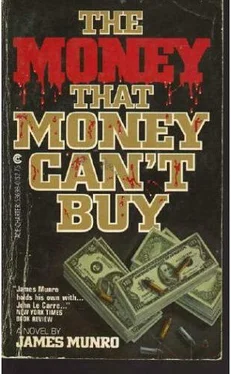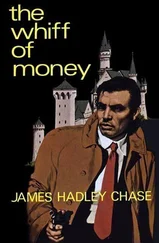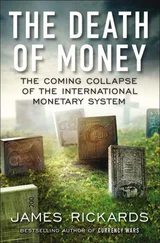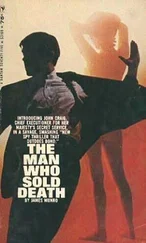"I don't know what we'd have done without you," said Craig. "Have some more coffee."
"Actually I think I'd better get back to the youth hostel," said Jane. And she added carefully: "Is it still snowing?"
"I'll give you a lift," said Craig.
In the Mark X she gave him every opportunity she knew, but he just wouldn't see her. Later, at home in Surrey, she examined herself in the mirror one day: thick darkness of hair, eyes, wide and trusting and brown as a sweet sherry (far too spanielly of course, but at least you could see the love in them), and her body firmed by youth, and with the first hint of ripeness. And all of it offered on a plate. As if she'd been a roast beef sandwich or something. Only he wasn't hungry. All she got was "Thank you very much, Miss Simmons," and when she asked if he'd need to see her again, "Oh yes. It's very possible."
And then the tail lights of the Jag, glowing in the dark. It really wasn't enough.
Loomis was delighted. His delight lasted for at least ten minutes, and then he gave way to an ecstasy of rage. The Russians on his patch, knocking off a Chinky without even saying "God bless you," and a Chinky, moreover, about whom he, Loomis, knew nothing. A Chinky who could have served baked beans and chips forever, for all Loomis knew or cared. Except that now he cared passionately. And they had nothing to go on. Nothing at all. Everything James Soong possessed had been searched, dismembered, searched again, analyzed, fingerprinted, spectrographed. And it told them nothing. James Soong had lived only in the present. His past, like his future, did not exist.
"You can't stop the Russians from trying to kill people," said Loomis. "I know. I've been through it all before. But this is the first time they've done it and I haven't known why. We've got nothing on this Soong character at all. Neither have any of the other departments. I had to go and ask." He shuddered at the memory. "It won't do." He hesitated. "I wonder if he ever went to Morocco?"
Craig remembered the files on his desk the day Soong was reported killed. They had all been about Morocco.
"Anyway, I got somebody working on that,"
said Loomis. "I got another idea as well. I think it's
about time we started chucking our weight about.
And I know just where we can chuck it. How
would you like to kidnap a Russki for me, son? Be
a bit of an interest for you. You knock off a
Russki, and they'll have to come and ask for him
back. And then," Loomis lay back like a basking
whale, "and then we can talk."
* * *
The Comet 4B landed on time at Barajas airport. Everything about it had been predictable: its punctuality, its comfort, the size of its drinks, the dullness of its food, the uncertain glory of its hostesses. Craig walked down the steps and hurried to the waiting bus—the wind from the Sierras was cold. The other passengers, like himself, huddled into their coats, as the bus jolted toward the administration building. There were only twenty of them.
It wasn't enough. Craig preferred the anonymity of a crowd, but this time there wasn't a chance. Loomis was in a hurry, and this was the fullest flight he could get.
That day the two Spanish officials had time to spare. They looked at his passport photograph three times and criticized the photographer, read slowly and earnestly through the details of his fiche, and at last let him in to Customs, where a thin, elegant Madrilefto ignored him completely as he scrawled on his two suitcases. One man had ignored him; two had looked at him, and his photograph, with care. Craig didn't like the odds. He took a taxi into Madrid, and stopped off at a car-hire place near the Puerto del Sol. They had a Fiat 1800 waiting for him, and once again he waited while Spaniards struggled with his passport—his name this time was Jameson, which they assumed began with a noise like a percussive "H"—then he signed the documents and drove out into the city and to the main highway to the south.
The car seemed good for 120 kilometers an hour, which for a hired car is excellent, and Craig enjoyed the almost empty road, the harshness of the high Sierras as he drove through New Castile. This was a country made for war, hard and pure and arid, its mountains gaunt and white-tipped still, their winter snow matte as a bandage on a wound, so that by comparison the Lake District seemed gentle as the mountains of a dream. He drove on to Toledo and stopped there and got out, as a tourist should, to buy paper knives of Toledo steel, and ate lunch, which was hot, aggressive, and yet eager to please, a very Spanish lunch. Then on again, through Ciudad Real to Valdepeflas, and there he spent the night. Valdepenas was quiet, restful, and almost devoid of tourist attractions. On the other hand, a vine grew there which produced an excellent wine. Craig drank it and in limping Spanish congratulated his waiter, who, being a Spaniard, took the matter as a personal compliment, and suggested another bottle, then apologized that the town should have nothing else to offer the foreigner. But the gentleman was going on to Granada? Ah, then tomorrow he really would see something worth seeing. The waiter was a Castilian, and despised Andalusia totally and comprehensively, but the customer had been nice about the wine. He thanked the Englishman again, and told him to the centimo how much his tip should be.
Craig woke next morning early, drove on to Granada, and hired a guide who gave him enthusiastic and quite often accurate information about the Generalife, the churches, the old town, Moorish architecture in general, and the Moorish contribution to the culture of Spain, then took him to a souvenir shop, and beamed with a schoolmaster's pride in a boy who had learned his lessons while Craig bought purses and marquetry boxes and mantillas and combs, and the shopkeeper and the guide said: "Tipico, ttpico," and when he had bought enough let him go. He lunched late and well, then set off again in the warmer air, driving on south, where orange and lemon groves were coming into blossom, through village after village where already the preparations for Easter were approaching the frantic, and petrol was scarce and not very good, and the mountains of the Sierra Nevada enfolded it all, an eternity of rock and snow. He bypassed Malaga, and turned west along the coast road, past the little seaside resorts where the foreigners—English, Germans, French, Americans, Swedes—were already arriving with their donations of pesetas to stabilize the Spanish economy, and asking in return only the sun, the opportunity to wear dark glasses, to dress in bright, weirdly cut clothes that they would never, never wear at home. He passed Torremolinos and Fuengirola, and arrived at last at Marbella. There was a bar he had to find, off the Calle Mayor, and he found it at last in a street of whitewashed houses, a bar bright with neon and a jukebox stuffed with the top twenty, and wrought-iron tables with marble tops, and portraits of the Queen and Union Jacks, and Watney's Red Barrel on the counter. Outside, in daylight, one could see an inn sign, with a picture. The bar was called "The Dog and Duck." It was full of Englishmen drinking beer, and Englishwomen drinking gin. Craig went inside, ignored two Spanish barmen, and waited for the attention of a squat, slow-moving, chunky man with pale, thin, nondescript hair and skin still pink from the sun, pale skin that would never darken to more than a fiery, ill-tempered red. When the man turned, Craig recited his formula.
"Forgive me, but you must be George Allen," he said.
The chunky man continued to wash glasses beneath the bar for a second, then said carefully: "I'm George Allen. Yes. Who might you be?"
Craig said: "Norman Jameson—Linda's brother."
Allen said, counting out each word: "Well, well, well." Then added: "How is Linda?"
Читать дальше












